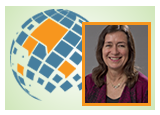|
 I’ve been thinking a lot about community lately. How we have
forged a strong TESOL community and pitched in to support one another during
this past year of crisis. How our personal and professional lives have expanded
with virtual communities and how enriched we are as a result of those
connections. I’m reminded of the sixth principle in our The
6 Principles for Exemplary Teaching of English Learners:
Engage and collaborate within a community of practice.
I’ve been thinking a lot about community lately. How we have
forged a strong TESOL community and pitched in to support one another during
this past year of crisis. How our personal and professional lives have expanded
with virtual communities and how enriched we are as a result of those
connections. I’m reminded of the sixth principle in our The
6 Principles for Exemplary Teaching of English Learners:
Engage and collaborate within a community of practice.
What is a community? A community is a group of organisms of the same
or diverse species that share a common or overlapping interest and assume
different or complementary roles in furthering their mutual goals or
objectives.
A community
can be a simple symbiotic relationship, as between a cattle egret and water
buffalo where each provides a service to the other. The egret keeps the water
buffalo free of pests and the buffalo provides a sustained source of food for
the bird. Or a community can be a highly specialized society within a single
species, as in honey bees, with discrete roles and sophisticated systems of
communication. A community can also be a football team with players having
varied and flexible positions that allow them to work as a unit to achieve a
single objective. What all these types of communities share is having a number
of individuals working in different roles for a common goal.
Can you
envision yourself in each of these three types, depending on the context? I
expect you can. But let’s take this one step further and reflect on a community of practice (Lave & Wenger,
1991)—defined for our purposes as a group of educators who engage in a process
of collective learning as they practice their profession by sharing knowledge,
resources, and experiences, and who build relationships to strengthen their
collaborative efforts toward common goals.
We know that
in 2020, our common goals were multifaceted:
-
the physical and mental
health and safety of our students, colleagues, family, and friends
-
job, food, and housing
security for ourselves and others we care for
-
the development of skills
to use distance learning platforms and online communication tools
effectively
-
the successful delivery of
English language instruction during a pandemic
We worked
collaboratively in many ways and made progress toward these goals.
What will
our common goals be over this next year? How will we organize our English
language teaching (ELT) communities of practice?

As most of
the world’s population gets vaccinated, we will return to more face-to-face
schooling and professional learning events. Yet we won’t cease all virtual
opportunities. Within our TESOL communities of practice, we’ll continue our
year-round connections with online chats, book clubs, e-groups, and courses.
Our upcoming webinar on 6 February, “Oral
History, Odyssey, and Identity in English Language Teaching,” honors
Black History month in the United States and may give you insights into an
unfamiliar linguaculture. Those who attend our upcoming TESOL Virtual
Convention on 24–27 March 2021 will join a new global community as
well.
As travel
opens up and visa bans are lifted, our international students can return to
their universities, and our colleagues can take up visiting fellowships and
other academic positions. We’ll start to plan and participate in hybrid
conferences and blended learning sessions, while our TESOL connections continue
to take us around the world.
Mahatma
Gandhi said, “The best way to find yourself is to lose yourself in the service
of others.” We all felt somewhat lost in the chaos of 2020, yet we continued to
serve. This year, 2021, promises to be better. We will show that we truly are
highly specialized, flexible, and competent ELT individuals who will continue
to make a difference in our communities of practice, and, consequently, we will
achieve our goals.
References
Lave, J.,
& Wenger, E. (1991). Situated learning: Legitimate peripheral
participation. Cambridge University Press.
Biography.com. (2014). 15
inspiring Gandhi quotes.
https://www.biography.com/news/gandhi-quotes
Deborah J. Short, PhD, is TESOL International Association president (2020–2021). She directs Academic Language Research & Training, LLC and provides professional development on academic literacy, content-based ESL, and sheltered instruction worldwide. She has led numerous research projects related to English learner education, codeveloped the SIOP Model, and served as series editor for several 6 Principles books. |